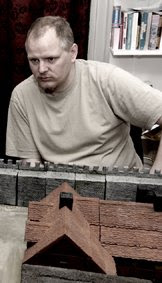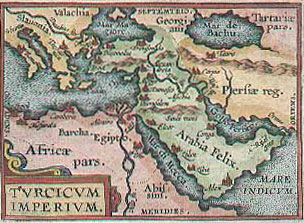Saturday, May 17, 2008
moifs DM guide
Bear in mind that most of this post is based on thoughts surrounding a faux Rennaissance game.
Takshendal chapter 2 is winding down now, though the murder mystery has yet to be solved. I'm already in the process of creating a follow up campaign, and swimming in the seas of my imagination and the labyrinth of Wikipedia's historical pages. In the course of this, amongst the many pleasures to be had in research, I've also come to realise a few things about creating worlds of the imagination, specifically role playing games set in historical or fantastical worlds.
'Gaming'
The thing to understand about running a plot-based role-playing game is basically that the DM is 'playing God', and everything in a 'campaign' is really an extrapolation of the DM's own psyché. If your suss enough to figure it out then you can start to figure out all kinds of strange things you never knew about yourself by identifying common themes in your games. My friends and I have had quite a few laughs about these common themes as some of them are very easy to identify. I seem to have a thing for large, powerful female non player characters for example, though to date I've never played one of these as a player character. Thats a more obvious example and not difficult to figure out....
A good player is some one who can either develop a character archtype or who can play multiple character types with ease ...or who can't do either, but doesn't take themselves too seriously as to believe that they can. Theres nothing more boring in a role playing game than some one with an inflated sense of their own ability.
Playing multiple roles with fundamentally different characters is very difficult and something even actors have to work hard to acheive. For the average player I find its almost impossible. Even gifted players have a tendency to revert to their own personality. This can get as annoying for a DM as any chronic bad habit, but you can also use it to your advantage if you take it into account. Allowing the player to develop their own 'character theme' can be very rewarding, provided they understand their own limitations. Personally I prefer to try to break my limitations, but I suspect I merely move about within an expanded definition of myself. I note a certain cynicism in all my player characters, regardless of who they are meant to be. I think most players are actually very aware of their own limitations and as a DM its important to allow them to feel at ease within the confines of their ability.
The thing to strive towards is having a good time and nothing is more important, but if you want to play a plot driven game, with more to it than giggles and slaughter, then its a good idea to define one's characters within the boundries set by one's acting ability, because essentially, its called role playing, not roll playing. If you want to do roll playing, then theres always Warhammer 40,000...
Ambience
From the perspective of a DM, there are two important things to always consider; plot and ambience. Of these, the latter is the most difficult to acheive since it requires being able to recreate an alternative reality in the minds of the players and obviously the players have to be receptive to this. Apart from just being an expert story teller, there are a number of ways to do this. In Takshendal I've tried to create an ambience by using lots of models as props, but the problem with this is it constrains the plot to such a degree that the game essentially becomes a board game and I reckon with hindsight that a table top based game is okay for one or two sessions, but after that it risks losing its lustre.
There are other ways to establish and maintain an ambience. Using period images, and historical styled maps can help ...if you can pull the style off. I've used 'The Counties of Britain' from 1616 by John Speede as my latest reference in an attempt to do this.
In Takshendal chapters 1 and 2 I didn't use any maps at all. The idea is, by limiting the visual aids and relying more on spoken descriptions, the occisional names of distant lands and the city as nothing but an impressionist backdrop in the players imagination, I would be able to create the impression of the game world as narrow and 'dark' much like the early Rennaisance might have been, even to the enlightened. Of course enlightened people would have access to maps, but its important I think, in order to get the old world perspective right, not to use modern maps containing reliable information (unless your playing a game in a contemporary or science fiction setting of course).
Ambience is a very difficult thing to create effectively, mostly because we are so used to cinemas use of mood enhancing music that the spoken word simply doesn't have the poetry to convey the same impact on the imagination. Giving people drawings and maps, using historical details and names and relying on descriptions, no matter how well written, simply can't compete with music. I've tried in the past to use music in the background to influence the mood, but it doesn't really work that well. A film is only two hours long and the music score is tailor fitted to that. A role playing campaign can rack up hundreds of hours and unless you have a veritable library of soundtracks and a DJ (or a guy with a piano) ready to evoke the mood, then forget it. Music in the back ground can be pleasant, but its a limited aid in creating ambience in a role playing game.
Images on the other hand do help. If your not a dab hand at drawing, then you can always trawl the net for reference pictures. There are numerous sites which are filled with old photographs, for example here, here and here, or paintings by old masters. My only advice with the latter would be to avoid the famous pictures in order so as to not get your players recognising a non player character a the Mona Lisa, for example.
The Curse of the Mysterons
Every game has certain elements that lend it that all important sense of mystery and purpose, but these should be used sparingly. In my head I call these ingredients 'Mysterons' because as often as not they inolve what X files fans came to call the 'freak of the week'; creatures dredged up to appear in just one episode to fill in the gap until the real story can be resumed. Lots of TV serials use these, Doctor Who being another notable example (which is what inspired the name).
In making a role playing game, I find the temptation to add mysterious elements, like magical swords, rare artefacts and dangerous creatures which have nothing to do with the actual story, detract from the game. I find its better to keep as few mysterious elements in play as possible because that way the actual mysteries retain their mysterious quality. There's nothing more boring than yet another dark lord with a super weapon sword bent on global annhiliation. In the matter of Mysterons, I find its better to keep them in their box as much as possible. Moderation allows for a greater sense of mystery when you finally do release one.
This is just my thoughts on the matter. Obviously different DM's will have their own approach and can create entertaining games in their own ways. Personally I strive for equilibrium between my desire to influence the players and their chance to influence the game. One important rule of thumb I've always held is never to impose my best laid plans onto the players. If they don't do as I've planned, or if they do something differently that means my preperation just went out the window, then never mind. Let the players dictate the course of events. There's nothing worse than sitting on a tour bus! If you find your good idea's are bing ignored, then keep them, and use them again at a later date.
Subscribe to:
Post Comments (Atom)





3 comments:
This is a very good post covering the essentials that we have sort of talked about and thought on over the last couple of years.
Ahhhh! The 40K dig! That's ok. When you visit the US, you can come play a Techpriest in the retinue of an Inquisitor. It's got plenty of flavor. It's not just rolls, I promise.
I'm for the music. I just hit play during the battles, or at key parts of the story. Not full time music.
I've also incorporated food. "The only thing to eat at the inn is venison stew and coarse bread." Then I serve 'em up some so they know what it tastes like.
I have had games ruined from my players drinking too much beer. That was a rookie mistake though.
hmm... a part of the reason why I find 40k so uninteresting is its reliance on historical references, especially considering it is meant to take place 38,000 years into the future. I just don't think military technology in the far flung future of humanity will be relying on clunky First World War tank designs, Crusader era 'chapters' or battle cry's in latin. The whole thing strikes me as being even more far fetched than Star Trek!
Its not that I have anything against a dark future of eternal warfare (as a game) but just that in such a scenario, I'd prefer to be gaming in the future, rather than in the past.
And then there is the circus element to the (horrbly expensive) minatures. All those garish colours over loaded with predetermined pageantry, naw.
Its a question of style. I like the notion of a dystopian future where war has become eternal. The scope for ambience is immense.
But the way GW went about it, just left me cold. I can remember reading the first introductions tot he game in White Dwarf, and they sounded great. The first Space Marnes had these really odd looking 'womble helmets' and I loved them. The descriptions of the space marines going into a skirmish and using a multi-melta to reduce a small copse to ashes was well written, but even then, the whole orcs and elves in space didn't make sense to me. Why rely on such fantastic aliens? Surely the dark future didn't need such a clumsy reference to Tolkien?
In my head, the dark future belongs to the machines. 'The Matrix' and Gregory Benford are on the right track. The real horror lies in the inhumanity of our own creations. Von Neuman machines devouring all in the path. The struggle to survive against superior technology. Run for your life!
I almost did get into Warhammer 40,000 at one point. I even invented my own chapter, which I called the 'Dark Decade', but it was not to be. My 40k idea's were all spun off into darker worlds of my own imagination and had nothing to do with what the geeks and nerds in my local role playing club were into. I joined Oleg's fantasy game instead and never looked back.
Post a Comment